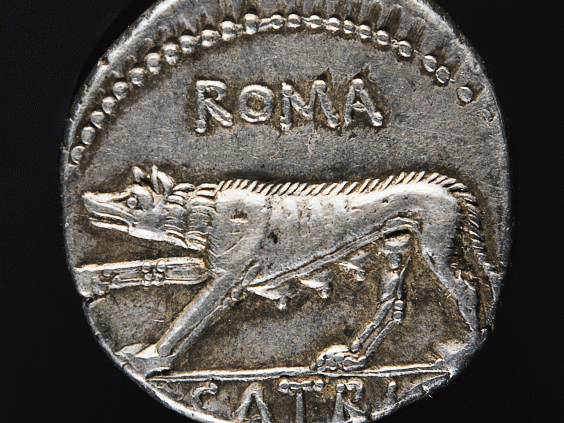Roman coins unearthed in Devon prompt historians to redraw map of the empire
Credit: Article by Jess Staufenberg – Independent.com (6-23-2016)
The boundary of the Roman Empire and its influence in Britain are being re-thought as the full significance of a discovery of coins in Devon begins to sink in.
The southwest of the country, which was previously thought to have rejected Roman influence, may actually have been intricately involved with Mediterranean culture given the presence of the Roman currency denarii, brooches, pottery and a Roman road.
Because the site at Ipplepen, 20 miles from Exeter, has only been excavated during one period every year since its discovery in 2009, archaeologists are only now confident of the significance of the site’s secrets.
In an interview with The Independent, Stephen Rippon, professor of Landscape Archaeology at the University of Exeter and leader of the excavation, said the site’s 1,000-year history challenged the idea that Devon had been mostly isolated from the Romans.
Instead, natives enjoyed wine and olive oil from eastern Mediterranean amphorae, as well as pottery from northern France and western Germany.
And a road, which suffered from pot holes and was re-surfaced four times to keep it in working order, has also been unearthed and likely continued 12 miles to nearby Totnes.
“The southwest peninsula has always been seen as this backward and remote region of Britain during the Roman Empire ‒ but actually it wasn’t,” Professor Rippon told The Independent.
“What we’re seeing is that these people at Ipplepen were clearly picking and choosing elements of the Roman life and Roman identity that they liked. They have acquired a taste for a Romanised life.”
Prior to this, archaeologists thought Roman influence stopped in Exeter, and the native British who took up its culture were those with Roman style-villas in Dorset and Gloucestershire.
<The limited extent of Roman’s expansion and influence into south-west Britain has been challenged by the discovery of 150 Roman coins (Rex Features)
But this Iron Age settlement in Devon proves that Roman trade and culture was seeping into this remote part of England by about the 50s AD under Emperor Claudius and through invasion by the renowned general, Vespasian.
Professor Rippon, however, said that the residents at Ipplepen retained their traditionally circular buildings and did not adopt Roman-style houses.
“One of the aspects of the site that I love is that you get these insights into daily life,” he said.
“The road had ruts in it, for example, which shows they were using horse-drawn carts around here.”
The team of archaeologists have also excavated a post-Roman era cemetery dated from the sixth to eighth century when Christianity had begun to spread across Britain.
The colossal discovery was made after two amateur metal detector enthusiasts, Jim Wills and Dennis Hewings, found a number of silver denarii and entered their findings into a large database called the Portable Antiquity Scheme.
Mr Wills said in 2012 it was “the find of a lifetime”.
“”I found the first Roman coin,” he told the Torquay Herald Express four years ago.
“It was a small silver coin called a denarius. The coin was minted in Rome and was probably brought here by the Romans when they invaded in 43 AD.”
Research into the site, which is being done by the University of Exeter, Portable Antiquity Scheme, the British Museum, Devon County Council and Cotswold Archaeology, will continue into next year.
Members of the public can also help with the excavation by applying at the local visitor centre, according to funding bodies.
Ancient Rome spread from Italy in the eighth century BC via an army, trade and infrastructure to cover southern and then central Europe, modern-day Turkey to the Iranian border, northern Africa, and also parts of Britain.
It transformed over that time from a monarchy, to a republic and then an autocracy, and lasted 12 centuries.*




































